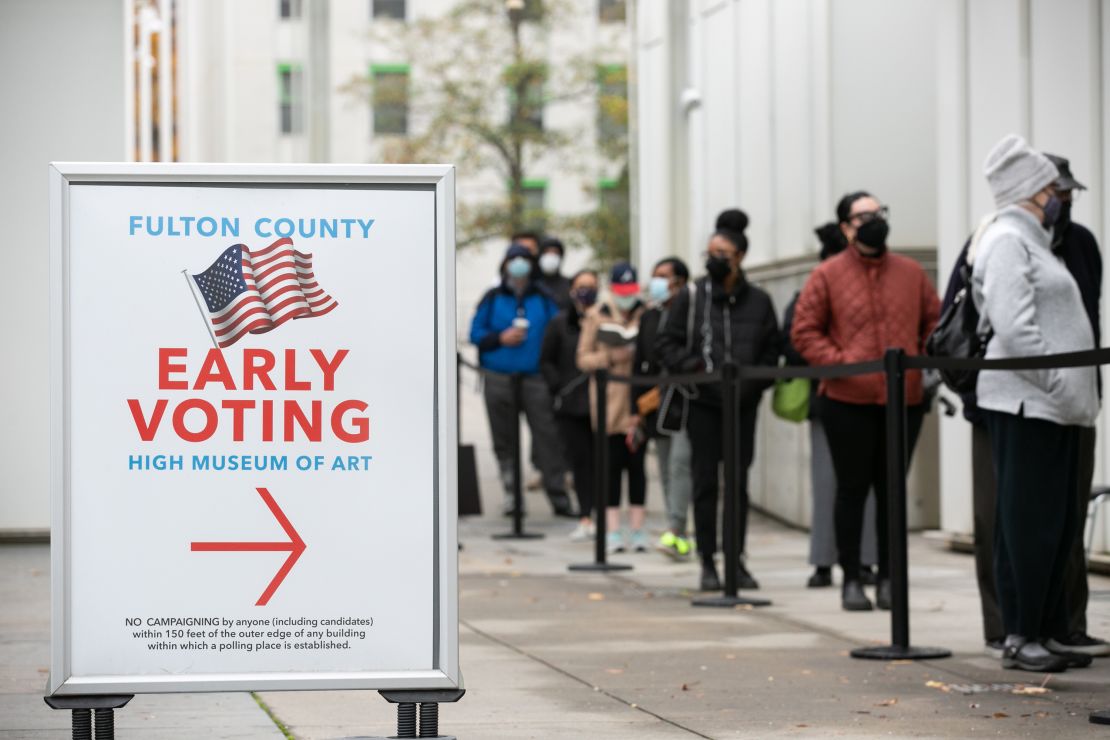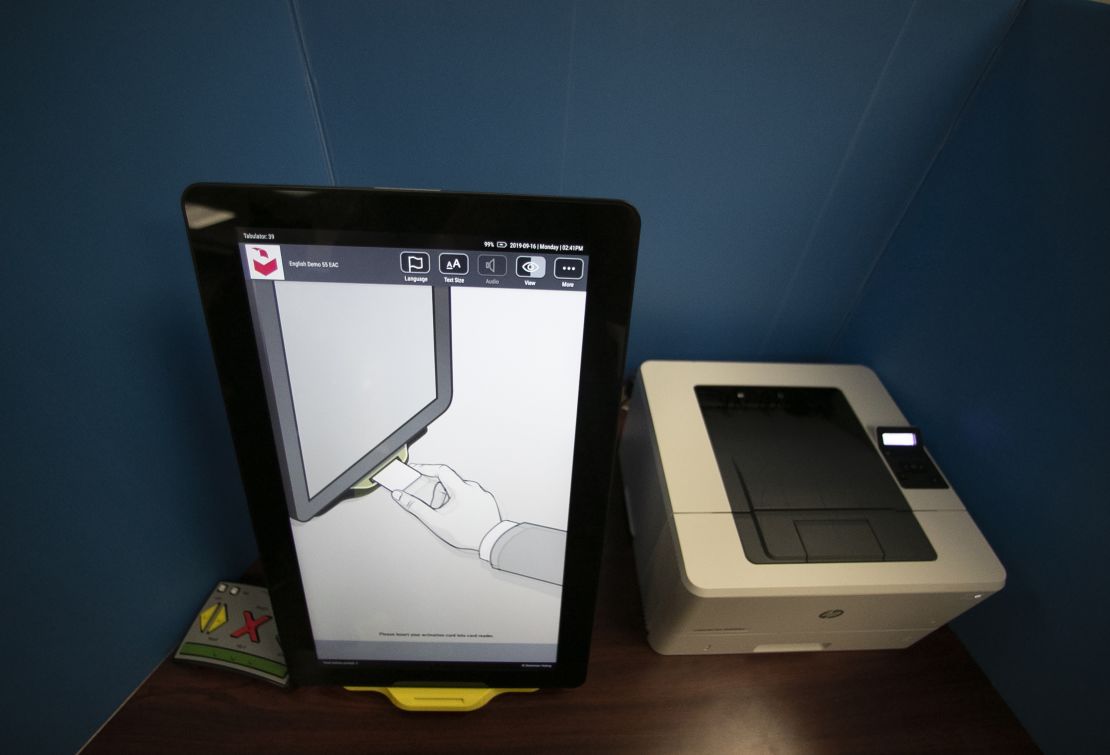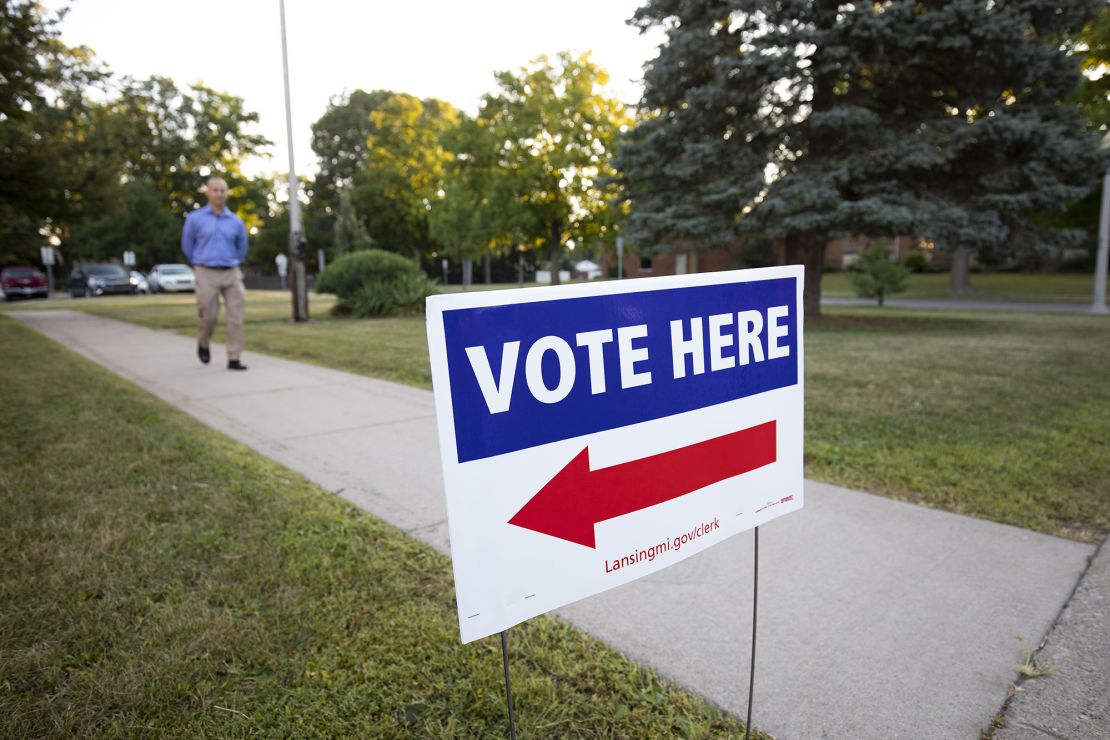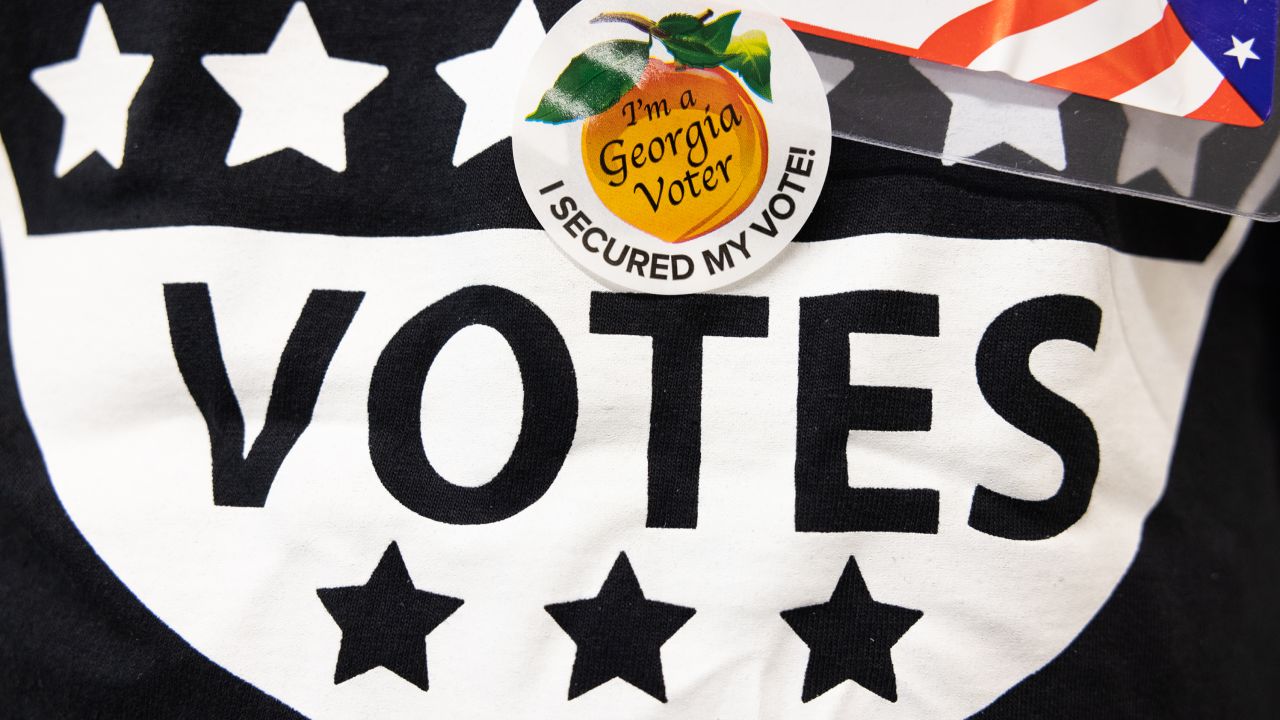Pop into a meeting of the Board of Elections in Spalding County, Georgia, and it may appear like any other eye-glazing?gathering of bureaucrats being led by a no-nonsense chair.
“We hang our political hats at the door when we come in and do the people’s work,”?Board Chairman Ben Johnson said at one meeting earlier this year. “There ain’t no room for politics in elections.”
But Johnson’s stated beliefs don’t appear to be so easily left at the door. An election-conspiracy believer, Johnson has authored a social media post to “fellow insurrectionists” and proclaimed that Joe Biden “is an illegitimate president.”
On social media, he has called for banning electronic voting machines, early voting and mail-in voting; echoed debunked claims about “ballot trafficking;” and proudly posted a photo with MyPillow founder and election conspiracist Mike Lindell.
Among other actions since taking office, Johnson has voted not to renew the county’s maintenance contract with Dominion Voting Systems – a frequent target of election conspiracy theories. As chairman, Johnson will have charge of the county board’s certification of the November midterm results – and his actions and continuing claims that the 2020 election was fraudulent have raised concerns over how he and the Republican-controlled board will handle the upcoming election.

Johnson is far from the only MAGA conspiracist inside the election process in a key battleground state. In Colorado, Michigan, Nevada and elsewhere, elections officials already have seen MAGA-leaning insiders allow election equipment to be breached, spread baseless fears about voting machine and election security, or take other actions that could stoke voter distrust.
“The foxes are absolutely inside the henhouses,” Barb Byrum, clerk of Michigan’s Ingham County, told CNN.
To be sure, election regulations, long-standing rules on auditing and testing of machines, and other layers of oversight offer safeguards for the electoral process.
However, actions by insiders that cast doubt on the fairness of that process – intentionally or not – “could have an impact on whether people perceive the outcome of an election to be real or fake, which is what we continue to see from 2020,” said Ryan Macias, an elections security consultant who previously worked for the U.S. Election Assistance Commission.
‘We need to move forward quickly’
Johnson was appointed chairman of Spalding County’s election board last year, after Georgia’s GOP-led legislature passed a law that changed rules for board membership. That subsequently flipped control of the five-member county board into Republican hands.
“It is inconceivable that we will have anybody on the election board that does not believe in fair elections,” Dexter Wimbish, a Democrat who sits on the election board with Johnson, told CNN. “That just makes no sense to me.”
Johnson’s conspiracy-laden beliefs have shown up in his work on the board. As first reported by The Guardian, Johnson falsely claimed in a board meeting last year that a judge had ruled Dominion voting machines were “illegal” in Georgia. He led the board last April in not renewing the county’s maintenance contract with Dominion, citing concerns about the expense of the contract and whether the company could respond quickly enough to any election-day issues, among others. Dominion is pursuing defamation suits against Fox News, One America News, Lindell and former Trump attorney Sidney Powell, among others, over baseless claims that its machines enabled vote fraud.

The move leaves the county primarily relying on its elections supervisor and trained staff to fix any mechanical or software problems that might arise in this November’s election.
Georgia’s secretary of state, meanwhile, is investigating a proposal considered by Johnson and the GOP-controlled board to hire an outside tech firm to copy data from election servers and other equipment.
While the election board ultimately dropped that plan, emails show Johnson was involved in the effort to hire the firm SullivanStrickler to obtain forensic images of the county’s election system.
“Unless anyone else has any concerns we need to move forward quickly,” Johnson wrote to board members and the county election supervisor about that effort on August 17, 2021.
An attorney for SullivanStrickler, which is also embroiled in an investigation into a voting system breach in Coffee County, Georgia, said the company is “continuing to cooperate with law enforcement” as it investigates election integrity matters.
An attorney representing the Spalding County elections board told CNN Wednesday that a grand jury in Fulton County, Georgia, intends to subpoena Johnson and two other Spalding County officials. As CNN has reported, that grand jury is looking into efforts to overturn the 2020 election results in that state.
A local group, Georgia Ethics Watchdogs, filed a complaint October 7 with the Georgia Attorney General’s Office raising concerns about Johnson, as election board chairman, allowing his IT firm – Liberty Technology – to do work on equipment used in an election on at least one occasion in October 2021, during early voting.
Johnson declined repeated interview requests from CNN. But in a February 7 Twitter post responding to various allegations, he accused locals and the media of lying about the intentions and motives of the board; denied that the board’s vote to end Sunday voting was racially motivated; and accused the former county elections supervisor of mishandling the 2020 election. He said the board would work to ensure that “every single voter who wants to vote, and is eligible to vote, is given equal protection of their right.”
In that same post, Johnson again claimed that fraud occurred in the 2020 election.
“It’s a scary situation,” said William Perry, head of Georgia Ethics Watchdogs. “And that’s why we’ve called for the attorney general to investigate, because somebody has got to go in and make sure laws that we know of aren’t being broken.”
‘Is this a legit thing?’
Over the past two years, the relentless, baseless MAGA campaign to claim the 2020 election was stolen from Trump has led to so much harassment of election officials – even in places where Trump won easily – that many have quit. In the past three years, 45 of 100 election directors in North Carolina have left, while Texas has seen a 30% turnover rate.
That exodus has led to the hiring of many new election officials. Some, through inexperience, have made mistakes that could feed further distrust – or, as one Michigan clerk found, unintentionally enable conspiracists.
Barely two months after she was elected clerk of Cross Village Township, in northern Michigan, Diana Keller was confronted by two men, one toting a handgun, claiming they’d come from the Department of Defense to do a forensic audit of her township’s vote tabulator.
“I was actually terrified,” she told CNN. “I didn’t trust them from the start. But I was told they’d contacted … the county clerk, and that she had said, ‘yes’ to the audit, which makes no sense.”
In a video of the incident obtained by CNN, and previously reported by the Traverse City Record-Eagle, Keller is seen asking whether the men are “from the state or anything?”
“I just feel like I should be checking who you are from?” she continues. “Is this a legit thing I’m doing for you?”
The men insisted they were legitimate and proceeded to prod the machine and try to attach a flash drive to it.
Authorities eventually determined that the plot to access the tabulator traced back to a woman named Tera Jackson, who claimed to be in touch with then-Trump attorney Powell and to have evidence of fraud tied to data stored on a satellite owned by the Vatican. Jackson pleaded guilty in February to a reduced charge of disturbing the peace in connection with the incident. No one else was charged.
“It was just a stupid, bungled thing. But I was too scared to do anything,” Keller said. “I was just so new to being a clerk, and I really questioned it, but I was also intimidated.”
Election conspiracists in Michigan have managed to gain access to at least five other vote-counting machines, called tabulators, and in some cases also to the software used to operate them.
Some Michigan clerks and election workers have shown themselves sympathetic to the stolen-election myth.
Lake Township Clerk Korinda Winkelmann told state authorities investigating voting machine breaches that she turned over a tabulator and a laptop computer that served as a poll book to an unnamed person who claimed to be an investigator conducting an audit of the election. Winkelmann told investigators she knew she wasn’t supposed to turn over a tabulator, but that she did because “they were doing some type of audit.” She said she “believes” there was election fraud in 2020, though not in her township, according to a police report from February.?Winkelmann declined comment to CNN.
Adams Township Clerk Stephanie Scott was stripped of election duties last year by the secretary of state’s office, after spreading election misinformation and refusing to allow routine maintenance to be performed on voting machines. That has forced Hillsdale County to take over running Adams Township’s elections since October 2021, Abe Dane, chief deputy clerk of the county, told CNN in an email.
Scott “continues to regularly spread disinformation … falsely claiming that our Hart InterCivic election management system and tabulators are connected to the internet or contain voter-specific data,” Dane said. In August, in an email obtained by CNN, Scott told other clerks in the state to “uphold election integrity” by ignoring a directive about voting data from the Michigan Bureau of Elections, which she called “the unelected bureaucratic office.”
Scott’s attorney, Stefanie Lambert, said her client refused to comply with a directive she contends violated the law. Lambert reiterated the baseless claim that the state’s elections are not secure.
Byrum, the Ingham County clerk, told CNN that there are “many checks and balances” to ensure that township clerks and other elections workers do their jobs appropriately. But, she said, the concern is that some who hold false election-conspiracy beliefs may act on them in a way that undermines public confidence.
“There are opportunities for election deniers to attack our elections system if they fly under the radar,” Byrum said. “Those election deniers who intentionally work to undermine the election will be caught, but at the expense of voter confidence.”
‘This is going backwards’
In a survey earlier this year by the Brennan Center for Justice, more than half of local elections officials said they worried that incoming colleagues might believe there was fraud in 2020. Still, roughly one in five said they plan to leave before the 2024 election – with a third of those citing political attacks.
Paul Gronke, a political scientist at Reed College who has surveyed election officials since 2018, said many are reporting high levels of stress and burnout. Some have experienced “harassment and abuse tied to election disinformation, even from their neighbors.”
“They’re very surprised and disappointed,” he said. “Likely, it’s a result of the media sources and politicians they listen to, mainly on the Republican side, promoting this disinformation.”
For example, in Nye County, Nevada, which sprawls over an 18,000 square-mile area between Las Vegas and Reno, veteran GOP clerk Sandra “Sam” Merlino called it quits in August, after 22 years at the job.
The final straw: County commissioners – based on meritless suspicions of voting machines – voted to have the 2022 general election ballots counted by hand.
“It’s disheartening,” Merlino told CNN. “To me, this is going backwards.”

Her replacement, interim clerk Mark Kampf, insists that Trump won in 2020, and that voters in Nye County no longer trust electronic voting machines because they aren’t secure.
Kampf plans to make Nye County one of the first in the nation to switch to hand-counting paper ballots, using electronic machines only for a preliminary tally this November. Nye County Commission Chairman Frank Carbone has said the commission hopes to do away with the machines completely in the future.
Nevada election officials, including GOP Secretary of State Barbara Cegavske, have fought back against misinformation, saying their electronic voting machines have been reliable and accurate, haven’t been hacked, don’t have modems and can’t connect to the internet. Cegavske has also noted that ballots can be readily verified by paper record.?
On October 17, the ACLU filed an emergency request to Nevada’s Supreme Court challenging Kampf’s hand-count plan. The group asked the court to rule by October 21, four days before county officials plan to start hand-counting mail-in ballots. Kampf did not return multiple calls from CNN.
Then there’s Storey County, a rural county of about 4,000 voters outside of Reno, where Jim Hindle was elected clerk and treasurer in June. Hindle is one of six Nevada Republicans who signed a false certificate pledging?to give?the state’s electoral votes to Trump, even though Biden won Nevada.
Hindle, who is vice chair of the Nevada Republican Party, replaces Doreayne “Dore” Nevin, who left her post early after losing the June GOP primary to Hindle.?In an August email obtained by CNN, then-clerk Nevin wrote, “It breaks my heart because I do love my job and that’s why I ran not because I’m a politician like Jim.”?Hindle declined to answer questions from CNN.
Doubling down on misleading claims
Some county clerks have been sidelined for the coming election, either because of past errors or actions that violated security rules.
Colorado’s secretary of state this week blocked a clerk in Elbert County, Dallas Schroeder, from being able to oversee the November election in his county. Schroeder previously was blocked from overseeing his county’s primary election in June, after state officials discovered he’d copied two election-system hard drives containing sensitive data. While that violated the state’s election regulations, Schroeder has tried to justify his actions with the misleading claim that voting machines contain “wireless devices” that can be hacked through the internet.
He told CNN, “Every one of our Dominion machines have a wireless device in them and we have no way to verify that hasn’t been utilized” – a widely debunked conspiracy.?
Schroeder testified that he copied the drives in the summer of 2021, with help from conspiracy peddlers linked to Lindell. According to the office of Colorado Secretary of State Jena Griswold, Schroeder signed an affidavit stating that he made a “forensic image of everything on the election server” and “saved the image to a secure external hard drive that is kept under lock and key in the Elbert County elections office.”?
Schroeder “provided those copies to individuals not authorized to possess these components,” according to Griswold’s office, which launched an investigation into Schroeder, and then sued him.
Schroeder denies providing the images to unauthorized individuals, telling CNN he was trying to preserve “vital election records.”
Schroeder isn’t alone in drawing state oversight. Citing incorrect ballots sent out in the June primary and a recent misprint, Griswold also appointed a supervisor to oversee the upcoming elections in Pueblo County, which would otherwise be run by Clerk Bo Ortiz, a Democrat. And Mesa County Clerk and Recorder Tina Peters – a Republican secretary of state candidate who lost the June primary – has been prohibited from overseeing the upcoming election. She faces a criminal trial, set for March 2023, for allegedly allowing unauthorized people to breach her county’s election system, to reveal what she believed was fraud in the 2020 election. She has pleaded not guilty.
Since 2020, election disinformation has never really stopped circulating, whether on social media, candidate fundraising efforts, or elsewhere. Some candidates this fall – such as Kari Lake, the GOP nominee for governor in Arizona – have adopted Trump’s 2020 approach and refuse to say they’ll accept the election results if they lose.
Voting is now underway. Colorado mailed out ballots for the November election on Monday. Key battleground states such as Arizona and Michigan already are receiving mail-in ballots. But if the midterm on November 8 is anything like the 2020 election, officials may find that their challenges are just beginning.
“Probably the biggest risk,” said Lawrence Norden, senior director of the Elections and Government Program at the Brennan Center, is “further erosion of trust in the election, and political leaders using that distrust, if they are unhappy with election results, to challenge them and further undermine confidence in the American electoral system.”
CNN’s Drew Griffin and Yahya Abou-Ghazala contributed to this report.






















